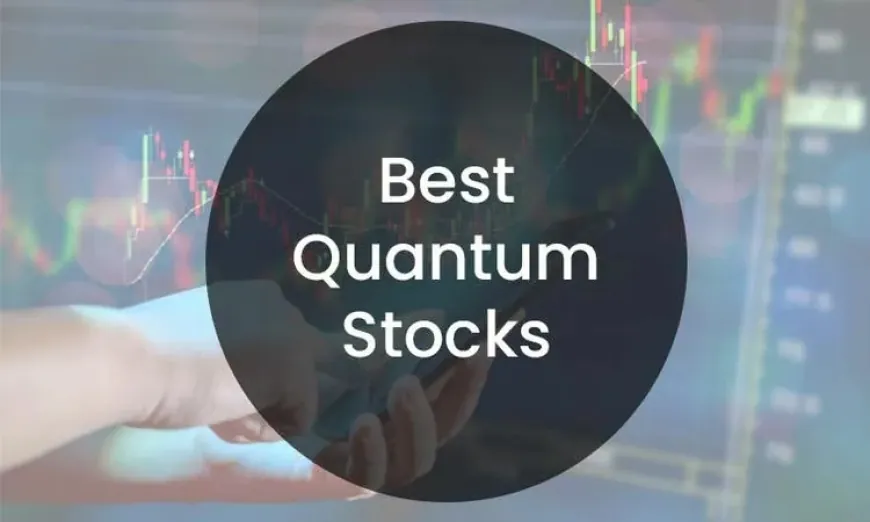Quantum Stocks Draw Fresh Market Action: IonQ and IBM Lead July Trades
IonQ and IBM are getting fresh attention in July as quantum computing stocks pull in new trades. One is a pure hardware play, the other is a long-term tech build.

Quantum computing is still an emerging technology, but if it succeeds, it could transform industries from healthcare to cybersecurity. McKinsey Digital estimates the sector could reach $1.3 billion by 2035, though the timeline is uncertain.
For investors who believe in the long-term potential of quantum computing, two stocks are currently standing out: IonQ (NYSE: IONQ) and IBM (NYSE: IBM). Each represents a different approach to quantum development—one as a specialized startup, the other as a tech industry veteran.
IonQ: A Pure Play on Quantum Hype and Hardware
IonQ has become one of the most discussed speculative tech stocks of 2025. The company isn’t selling cloud services or AI subscriptions—it’s selling the future of hardware.
Founded in 2015 by two quantum physicists, Christopher Monroe and Jungsang Kim, IonQ is focused entirely on building trapped-ion quantum computers. These machines use lasers to manipulate single ions as qubits, a sharp departure from the superconducting methods favored by Google and IBM.
In September 2024, IonQ crossed a technical milestone when its system surpassed 99.9% fidelity—a benchmark for error reduction in quantum computing. The company also claims its qubits stay stable for seconds, compared to the milliseconds typical in other designs. For hardware traders and tech speculators, those announcements triggered a round of aggressive positioning in IonQ shares.
But the market for commercial quantum computing doesn’t exist yet. IonQ is selling a roadmap, not a finished product.
A Cash Raise and Federal Contracts
IonQ nearly doubled revenue last year, reaching $43.1 million, but still closed the year with a $331.6 million net loss. Its spending is heavy, and profits are not part of the near-term story.
In response, IonQ raised $1 billion in new stock, pushing cash reserves to $1.7 billion. The move gives the company breathing room but adds dilution risk for current shareholders—a factor that has made IonQ’s stock one of the more volatile small-cap tech trades of the year.
Despite the financial burn rate, IonQ is finding buyers for its systems. It has signed multiple contracts with the U.S. Air Force Research Lab and the Department of Defense, deals that lend legitimacy to the company’s trapped-ion pitch.
Even so, traders know they’re buying into a long-term speculative play. The company’s CEO, Peter Chapman, has told investors he expects IonQ to hit $1 billion in sales by 2030, but that projection is based on bets that quantum computing will evolve faster than most analysts predict.
IBM: Building Quantum Without the Risk Premium
IBM has been involved in quantum computing since the early 2000s, but it hasn’t chased the speculative investor crowd. For IBM, quantum is part of a much larger portfolio alongside AI, cloud software, and mainframes.
Its Eagle processor, launched in 2021, was the first quantum chip to break 100 qubits. Its latest system, Condor, is the second-largest quantum computer globally by qubit count.
IBM has laid out a deliberate timeline: It plans to demonstrate quantum advantage by 2026, proving that a quantum system can outperform classical computing in at least one practical task. By 2029, IBM expects to deliver a fault-tolerant quantum computer—the holy grail of quantum development, capable of running calculations reliably even when some parts fail.
IBM isn’t selling this as a moonshot. It’s selling it as part of its infrastructure roadmap.
Funded by Profits, Not Hype
IBM is bankrolling its quantum work the old-fashioned way—through operating income. In April 2025, the company announced a $30 billion investment in quantum systems and mainframes, all drawn from cash flow. This is part of a $150 billion, five-year commitment to domestic tech infrastructure.
The company reported $14.5 billion in revenue for Q1 2025, with $8 billion in gross profit. Margins widened to 55.2%, up from 53.5%, driven by a mix of software sales and enterprise services. IBM finished the quarter with $17.6 billion in cash on the balance sheet.
IBM shares are up 29% this year, but quantum isn’t the main driver. Institutional funds are buying IBM for AI, automation software, and consulting growth. Quantum is considered a long-tail asset—not yet priced into earnings forecasts but viewed as a strategic advantage for the 2030s.
How Wall Street Is Playing Both Stocks
On Wall Street, IonQ is viewed as a high-beta, high-risk growth name—the kind of stock that moves fast on headlines but carries long-term uncertainty. Traders are watching for new government contracts, tech breakthroughs, or partnership deals that could send the stock moving again this summer.
IBM, by contrast, is a defensive large-cap with a quantum side bet baked into its core business. Fund managers like the stability of IBM’s cash flow while keeping one eye on its hardware milestones. The company’s quantum program may not affect near-term earnings, but it could reshape IBM’s market position over the next decade.
Both stocks are showing up on trading screens this month, but they represent very different risk profiles. IonQ is trading on potential. IBM is trading on execution.
Also Read: Nvidia Secures US Approval to Resume AI Chip Sales in China After Billion-Dollar Loss






























































